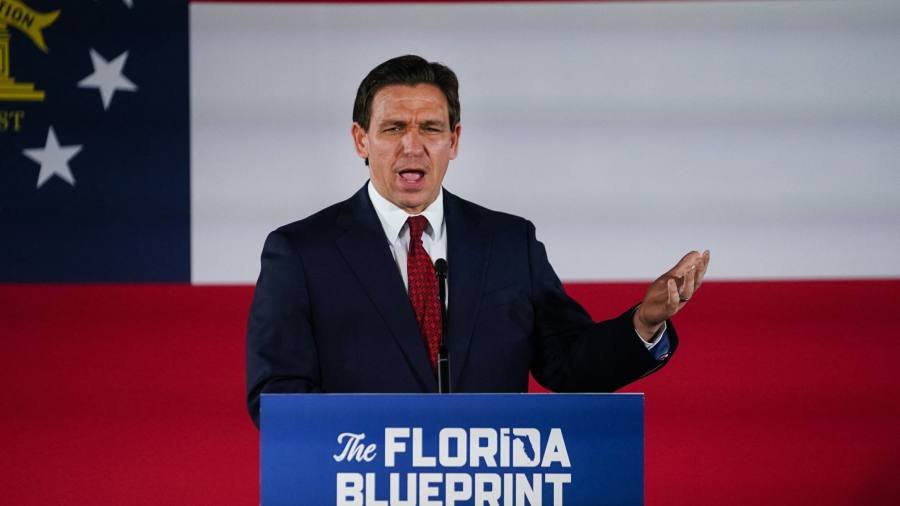
Minutes after Donald Trump released a statement on Thursday night calling a Manhattan grand jury’s vote to indict him on criminal charges “political persecution” and a “witch-hunt”, Republican Florida governor Ron DeSantis leapt to the former president’s defence.
“The weaponisation of the legal system to advance a political agenda turns the rule of law on its head,” DeSantis tweeted, calling Manhattan prosecutor Alvin Bragg a “Soros-backed district attorney” who was “stretching the law to target a political opponent”.
The robust statement of support from DeSantis, who is expected to be Trump’s main rival for the Republican nomination for president in 2024, marked the latest twist in his fraught calculus over how to position himself in relation to the former president. In recent weeks, the governor has wobbled in his attempts to appeal to Trump’s base while weathering persistent attacks from him.
“DeSantis recognises what a big moment this is not just for his candidacy, the Republican party, but also the country,” said Ford O’Connell, a Republican operative in Florida. “What really animates Republicans is the idea that there’s one tier of justice for Biden and the Democrats, and there is another tier of justice for Republicans.”
DeSantis’s show of support aligned him with other Republican presidential hopefuls, who have been increasingly united in criticising the Manhattan district attorney — a move that underscores Trump’s enduring grip on the party despite his mounting legal woes.
Mike Pence, Trump’s vice-president who fell out with his boss over the January 6 2021 attack on the US Capitol, called the indictment an “outrage” that “appears to millions of Americans to be nothing more than political prosecution”.
Glenn Youngkin, the former Carlyle co-chief executive and Republican governor of Virginia who has also reportedly considered a run for the White House, called the charges “beyond belief”, adding: “Arresting a presidential candidate on a manufactured basis should not happen in America.”
Republicans said the widespread support demonstrated Trump’s frontrunner status — and exposed political vulnerabilities for the Democrats, many of whom are bullish on the incumbent president Joe Biden’s ability to beat Trump at the ballot box in 2024.
“The Democrats have opened up Pandora’s box,” O’Connell said. “They think that they want to face Trump, but they have also found a way to unify Republicans in a way that I think was unimaginable.”
The White House has remained tight-lipped on Trump’s impending charges. Biden on Friday morning repeatedly refused to answer reporters’ questions about his predecessor, simply saying at one point: “I have no comment on Trump.”
Later on Friday, Karine Jean-Pierre, White House press secretary, also largely demurred from answering questions on the case. She told reporters: “All of us, including the president, found out about the news . . . just like every other American, through the news reports.”
Republicans and Democrats alike acknowledge that Trump’s indictment is likely to give at least an initial jolt to his presidential primary campaign, boosting his polling numbers among the Republican grassroots who see him as a victim of the establishment. It is also likely to energise his ability to raise money from the small-dollar donors who have contributed to his coffers over the years.
Within hours of the news of the grand jury’s vote in Manhattan, the Trump campaign was already sending fundraising appeals to supporters. In one email on Friday, with the subject line “RUMOURED DETAILS OF MY ARREST”, Trump said he was “not afraid of what’s to come” and called on fans to “make a contribution to stand with me in the fight to SAVE AMERICA”.
But while opinion polls consistently show Trump remains the clear frontrunner to be his party’s presidential nominee in 2024, several recent surveys also suggest his indictment could damage his chances should he make it to the general election next November.
A Quinnipiac University poll published on Wednesday, one day before the grand jury voted to indict Trump, showed 57 per cent of Americans thought criminal charges should disqualify him from running for president again.
The same poll found that in a hypothetical match between Trump and Biden — who has not formally said he is seeking re-election but is widely expected to in the coming months — the incumbent received 48 per cent of the vote, compared to 46 per cent for Trump.
However, the poll also pointed to potential weaknesses for Biden, namely if he were to face a Republican other than Trump. The survey showed that in a head-to-head match between Biden and DeSantis, the Florida governor would beat the current president, 48 to 46.
Such polling has led many Democrats to cheer on the possibility of another Trump candidacy. But others warn that doing so could be a grave error.
“It’s a high-risk proposition,” said Matt Bennett, co-founder of Third Way, the Democratic think-tank. “And when you’re talking about the downside risk of that being a Trump presidency, which is, I think, the scariest possible outcome for American politics . . . I just don’t think it’s worth the risk.”
“It is a coherent and sane strategy,” Bennett added. “But I think it is a mistake.”